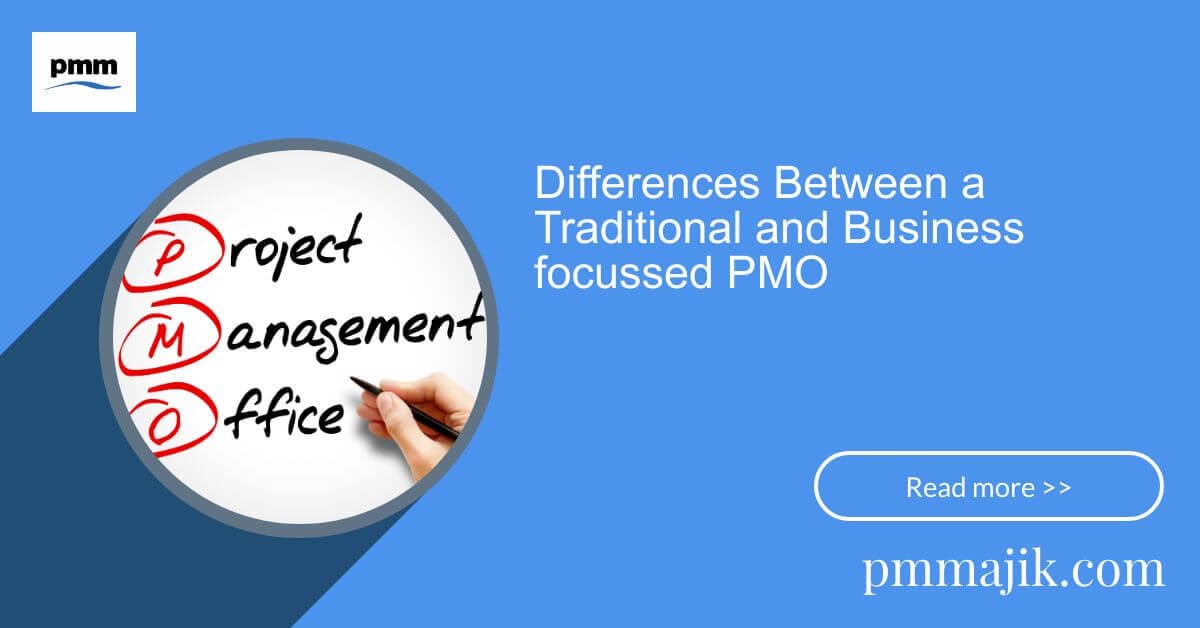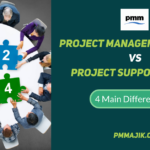A project management office, or PMO, has historically be used to oversee all the projects being undertaken in a company and to analyse the data on them. PMOs are changing and shifting their remit, so what’s the difference between a traditional and a business-focussed PMO?
A business-focussed PMO, sometimes known as an enterprise project management office or EPMO, looks at different information and works towards different outcomes. We’re going to explore:
- The different functions of a PMO
- Why you would want a traditional or a business-focussed PMO
- Staffing your PMO
Enabling you to choose which type is best for your working situation.
What do PMOs do?
Traditional PMO
In a traditional PMO, the function is to manage and oversee every project that has been commissioned in the business. The aim is to ensure that every project is compliant with its targets and remit and to iron out any inconsistencies and variance.
Reports are produced about each project and also to compare projects with one another. A traditional PMO will measure:
- Project completion rates
- Improvements in progress of projects
- Resources used in a project
- Skills used and required
Along with other matrices to ensure the overall success of the projects that are in progress.
The overall aim of a traditional PMO is to ensure that a project reaches completion on time and on budget. It’s there to check a project meets the requirements that were initially set for it.
Business-focussed PMO
Rather than looking after projects that have been ordered elsewhere in a business, an EPMO is there to help choose projects. The office will look at the business case for each intended project to see what effect it will have on the productivity and profitability of the company.
When your project management office is business focussed, it will:
- Work to ensure a positive return on investment in each project
- Continually push a project to be able to improve the bottom line for the business
- Make sure each project is striving to make tangible improvements
- Be a catalyst for project success, rather than a barrier
And not focus so much on reporting on process and governance.
An EPMO will act like a leader for the project managers in its remit. Rather than managing and ensuring compliance, the office should work to drive excellent performance in each project, not just to hit milestones.
The different uses for different PMOs
Different organisations will need a PMO to function differently. A traditional PMO will still have its place, particularly in large corporations that need a central collection point for data and information.
When many projects are running, and are utilised across many different business units a company should be certain each is performing. In this case, there may be space to have both a traditional and a business-focussed PMO.
As a smaller, more nimble company, having a PMO that looks after the bottom line is vital. Projects can make up a significant amount of expenditure, particularly in companies looking to scale and expand.
Having a department that can present the business case for a project can make board level decisions much easier. An office that’s designed to lead rather than manage can also influence the tone for project manager to follow.
Who to employ in your PMO
Both types of project management office will need a different type of skillset. If you’re refocussing your PMO, you can upskill or retrain them for the different competencies.
In a traditionally set up PMO, you want to have people with subject matter experience. This is so that the team is keenly aware of the data they’re monitoring. There needs to be a manager in the true sense of the word – a person who can interpret and understand data and get into details.
For a business-focussed PMO, a leader is needed. A person who’s aligned with the overall goals, culture, and strategy of the business is best placed to run this style of office. Rather than having a project management specific background, a general knowledge of business and leadership will see the office be successful.
Conclusion
The differences between a traditional PMO and a business-focussed PMO are quite clear. The roles of each are clearly defined – a traditional PMO monitors data and ensures compliance with deliverables whereas a business-focussed PMO selects projects on the basis of business need and ensures they produce a good return.
There is a place for each, and in big organisations there can be both. A different type of employee is needed in either PMO, depending whether you want an office that manages projects or leads project managers.






